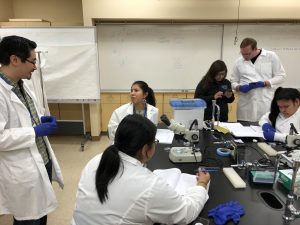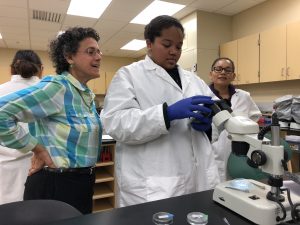Heritage University, PNWU entice students to science
Toppenish, Wash. –Heritage University and Pacific Northwest University of Health Sciences have come together with the Mt. Adams School District and the Yakama Nation Tribal School to create a unique science-focused program for young people living on the homelands of the Yakama Nation.
The five-week long Summer Program for Yakama Students (SPYS) encourages and rewards young people in the Valley to enroll and succeed in science classes. Dr. Maxine Janis, president’s liaison for Native American affairs at Heritage University, and Dr. Mirna Ramos-Diaz, assistant professor of family medicine at PNWU, and Dr. Naomi Lee from Northern Arizona University created SPYS. Dr. Janis and Dr. Ramos-Diaz co-wrote a proposal to the National Institutes of Health (NIH) and received notice of funding days before the program began in the Yakima Valley.

First week of classes in the Summer Program for Yakama Students project at Heritage University
“I just want to emphasize that our collaboration is the only way this program is possible,” said Dr. Ramos-Diaz, SPYS co-director. “What makes my heart sing is the work from everybody so we could build this pathway program for our underrepresented youth.”
The intent of the program is simple – build and strengthen the scientific knowledge and motivation of students to enter the health sciences and do well in their science curriculum. Upon successful completion of the program, the high school students may be able to participate in a two-month internship at the National Institute of Neurological Disorders and Stroke (NINDS) at the NIH in Bethesda, Maryland.
Dr. Janis and Dr. Ramos-Diaz have worked closely for years on both the summer internship program and the Roots To Wings program that involves both schools. “I am thrilled to be working with partners who feel as passionately as I do in developing programs that will benefit the Native peoples of our Valley.”
SPYS is a comprehensive science-based education program which integrates traditional ecological knowledge (TEK) as part of the curriculum. The program will also offer instruction on how to apply for college, seek scholarships and financial aid, and learn successful study habits. Local culture is also woven into the curriculum, such as incorporating the knowledge of various foods into the study of chemistry, and integrating Native traditions and values into science. “We know that combining culture with science makes the course of study more accepted by students, who in turn will do better in these types of programs,” said Ramos-Diaz.
The SPYS program is designed to provide opportunities for underrepresented youth to seek health professions pathways. Native Americans and Mexican-Americans under the age of 18 living on the Yakama Nation are participating in SPYS. Once they complete the program, these students will be in the position when they turn 18 to complete a competitive application for a summer internship at the NIH in Bethesda.

First week of classes in the Summer Program for Yakama Students project at Heritage University
Guest lecturers from across the nation will join Heritage and PNWU faculty for SPYS. Dr. Rita Devine, program coordinator for NINDS and Dr. David Wilson, director of the Tribal Health Research Office at NIH will visit the students and observe their progress. Dr. Wilson’s office coordinates NIH research related to the health of American Indians and Alaska Natives (AI/AN) at NIH institutes and centers. “Dr. Wilson’s presence at SPYS will bring a great deal of prestige to the program,” said Ramos-Diaz.
“The NIH always seeks to support pilot programs such as SPYS to demonstrate how underrepresented students in health sciences disciplines can conduct research that will impact health, disease and health care outcomes,” said Dr. Janis. “Support for the SPYS preparatory education program offers opportunities for our Native youth to become active participants as scholars in the health sciences.”
Heritage University in Toppenish will host the first week of SPYS beginning July 9, 2018. PNWU in Yakima, Wash. will host the second and third week, with the program returning to Heritage for the final two weeks.
For more information, contact:
Maxine Janis at (509) 865-0737 or Janis_M@Heritage.edu
Mirna Ramos-Diaz at (509) 249-7796 or MRamosDiaz@pnwu.edu

